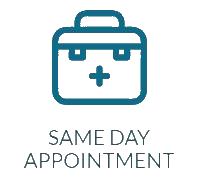Website built by:
JOINT INJECTIONS IN MANHATTAN

What are joint injections?
A joint injection involves injecting a medication into a joint in order to relieve painful symptoms and improve the joint’s function. There are two main types of joint injections for hip and knee joints:
Corticosteroid Injections
Corticosteriod injections are powerful inflammation-reducing drugs. Corticosteroids limit the dilation of the small blood vessels in and around a joint, which help to reduce blood flow and decrease the accumulation of immune system cells associated with inflammation and joint damage. Corticosteroid injections are beneficial in treating conditions such as carpal tunnel syndrome, trigger finger, frozen shoulder, gout, along with many other joint conditions.
Hyaluronic Acid Injections
Hyaluronic acid injections involve the application of hyaluronic acid, which is a substance naturally found in the synovial fluid of joints. Injecting synthetic hyaluronic acid into a joint can cushion and lubricate the joint, thus improving movement and reducing pain. Hyaluronic acid injections are beneficial for the treatment of osteoarthritis of the knee. This treatment option may also be a good procedure for a patient who has a health condition that makes him or her a poor candidate for a joint replacement, or for those patients who have to wait to undergo a joint replacement surgery.
Why are joint injections performed?
Joint injections can be an effective treatment for numerous painful and inflammatory conditions, including:
- Rheumatoid arthritis
- Psoriatic arthritis
- Tendonitis
- Bursitis
- Osteoarthritis
What are the most common application sites for joint injections?
Some of the common joint injection sites include:
- Knees
- Ankles
- Shoulders
- Facet joints – small bony structures located between the vertebrae of the spine that promote spinal stability
- Sacroiliac joint – the joint located at the bottom of the spine that connects the spine to the hips
What does getting joint injections involve?
In either type of joint injection, whether it’s corticosteroid or hyaluronic acid, the doctor will position the needle into what is called the joint space (the space between the ends of the bones). Prior to inserting the needle, the joint will be felt in order to determine exactly where the injection needs to be placed. Once identified, the injection area will be cleaned with alcohol and a numbing agent is often applied, in order to eliminate any discomfort during the injection. Before the injection is administered, your doctor may first aspirate the joint, which involves drawing fluid out of it using a needle and syringe. Next, the medicine is administered into the joint and the joint is then moved around to disperse the medicine. The entire procedure takes approximately 10-20 minutes.
After getting a joint injection, you may experience minor soreness around the injection site for a few days. The effects and degree of pain relief from a joint injection is dependent upon your condition, but most patients start noticing relief within the first week. In some cases, multiple rounds of injections may be necessary. The length of time that the effects of joint injections last will also vary depending on the patient and the type of injection used. In some cases, one cortisone injection can resolve the problem permanently, while the effects may only last 1-2 months in other cases.
What are the benefits of joint injections?
Joint injections can be highly effective at decreasing localized pain and swelling in a joint. Joint injections may also decrease the accumulation of fluid and cells in the joint and can temporarily decrease stiffness.
Schedule your appointment today!
If you are experiencing arthritis or another painful condition that may warrant a joint injection, the first step is scheduling a consultation with our board-certified physiatrist at Park Avenue Medical Professionals. Our practice is known for our compassionate care and personalized approach. Schedule an appointment today by contacting our office at 212.427.2000. You can also make an appointment by filling out this form.



